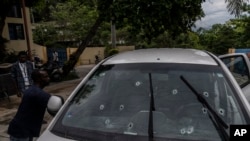The dangers for journalists in Haiti have escalated in recent months, with killings, abductions, and attacks among the most pressing threats.
In the latest incident, the independent broadcaster Radio Antarctique was burned down in an apparent gang attack.
About 50 men armed with assault-style rifles attacked the town of Liancourt, about 110 kilometers from the capital, Port-au-Prince, in the early hours of July 23 and burned down the station along with dozens of houses, according to the New York-based Committee to Protect Journalists, or CPJ.
"They smashed everything and then set fire to it. It was reduced to ashes," the broadcaster's founder, Roderson Elias, told CPJ.
Elias founded Radio Antarctique a year ago and ran it with around a dozen staff. None of them was injured in the attack, but four residents from Liancourt were killed and several others abducted, according to reports.
VOA reached out to the station but did not immediately get a response. In media interviews after the attack, however, Elias said he believes that gang members had targeted the station because of its reporting, and that he had received threats earlier in the year.
The station regularly reported on violence and other issues affecting the community.
The CPJ reported that the head of a local gang had accused Elias of turning residents against his group, and the media nonprofit warned that the situation for media in Haiti "remains untenable."
"Local authorities must restore order so that all citizens, including journalists, can live without fear from armed gangs," Cristina Zahar, CPJ's Latin America and the Caribbean program coordinator, said in a statement. "Journalists should not face violent retaliation simply for doing their jobs."
Haiti's embassy in Washington did not immediately reply to a VOA email requesting comment.
The deteriorating state for media parallels broader insecurity since the 2021 assassination of President Jovenel Moïse.
For journalists, one of the biggest risks is kidnapping.
On July 21, unidentified people kidnapped radio host Blondine Tanis near her Port-au-Prince home, demanding a ransom for her return.
On Monday, CPJ reported that Tanis had been released.
"The decline in her health while in gang custody is deeply concerning," CPJ's Zahar said in a statement announcing the reporter's release. "It is unacceptable that gangs have repeatedly kidnapped members of the press and held them for ransom."
Tanis' abduction came a few weeks after radio journalist Marie Lucie Bonhomme of Vision 2000 was kidnapped from her home on July 13.
Bonhomme was released after a few hours, but then her husband, Pierre-Louis Opont, co-owner of independent Télé Pluriel channel 44, was kidnapped a week later. As of late July, he was still missing.
Some journalists estimate that as many as nine reporters have been kidnapped in Haiti since the start of the year.
"Haitian journalists were already risking their lives whenever they went into the field but now they are in danger even when at home," Artur Romeu, director of the Latin America bureau at Reporters Without Borders, said in a statement.
"We call on the Haitian government to redouble its efforts to obtain Pierre-Louis Opont's swift release and to take urgent measures to protect Haitian journalists from gang violence, in order to end the climate of terror in which they are currently immersed and to create the security conditions needed to practice journalism in Haiti," he said.
Deadly violence is another concern.
In April, two radio journalists were killed in Haiti. Dumesky Kersaint was shot in the Mahotiere 83 neighborhood in the municipality of Carrefour in mid-April, and radio host Rico Jean was found dead on April 25 after being kidnapped the night before, according to regional media rights organizations.
In 2022, at least seven journalists were slain in Haiti, according to the CPJ data, which shows that at least five of those killings were in direct connection with the reporters' work.
In response to the killings in April, UNESCO Director-General Audrey Azoulay released a statement saying, "All too many Haitian journalists pay the ultimate price for their reporting, restricting the vital flow of information to populations."





